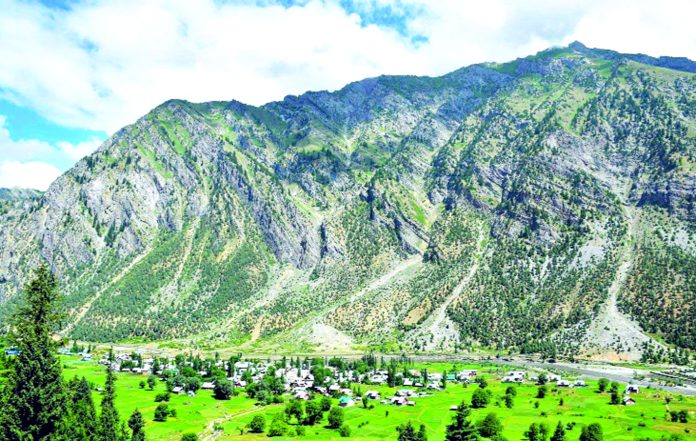Humaira Bano
Gurez Valley in Jammu and Kashmir, often hailed as one of the region’s hidden gems, is nestled in the Himalayas. Known for its stunning landscapes, clear rivers, and rich cultural heritage, Gurez has long attracted visitors. However, since the abrogation of Article 370, the valley has seen significant changes in infrastructure, politics, and society, leading to new aspirations among its residents.
Situated about 123 kilometers from Srinagar along the Line of Control (LoC) with Pakistan, Gurez Valley is connected via the Razdan Pass. The valley is renowned for its breathtaking beauty, with snow-capped mountains and the Kishanganga River flowing through it. Its diverse wildlife includes rare species such as the Himalayan brown bear and snow leopard. The Shina-speaking Dard tribe adds to the valley’s cultural richness. In recent years, especially from 2022 to 2024, Gurez has experienced a notable rise in tourism. The valley, once primarily recognized for its strategic military importance, is now emerging as a popular tourist destination. Visitor numbers surged by nearly 50% in 2023 compared to previous years, thanks to improved road connectivity, better government marketing, and the valley’s reputation as a peaceful retreat.
Efforts to beautify Gurez have played a crucial role in this transformation. The government has focused on eco-friendly infrastructure, including tourist accommodations, campsites, and trekking routes, while promoting sustainable tourism. Homestay programs have also boosted the local economy and provided visitors with an authentic Gurez experience. The abrogation of Article 370 in August 2019 marked a turning point for Jammu and Kashmir, including Gurez. Previously, Gurez faced restrictions on land ownership and industrial development, coupled with poor connectivity and security concerns. These factors limited tourism and economic opportunities.
Since the removal of Article 370, Gurez has seen significant development. Improved roads, consistent electricity, and expanded telecommunications have enhanced local quality of life and tourism. The region is now open to outside investment, promising further opportunities. Political changes have empowered locals to demand better governance and infrastructure. However, challenges remain, including the need for improved healthcare and education facilities.
With the Jammu and Kashmir Assembly elections approaching in 2024, Gurez Valley has become a key focus. This will be the first election since Article 370’s abrogation, and local residents are eager to make their voices heard. Political campaigns in Gurez have attracted significant attention, with parties vying for local support. Residents, having experienced both the limitations of the pre-Article 370 era and the changes since, are now more aware of their rights and expectations. They seek better infrastructure, particularly in healthcare and education, and want to ensure that tourism benefits all sections of society.
Nasir Ahmed Khan, a three-time MLA from Gurez, is contesting again with Congress’s support.
The National Conference (NC) and Congress have allied on this seat, with Congress backing NC in Gurez. Faqir Mohd Khan, a strong contender and BJP candidate, has a significant vote base and is expected to provide strong competition. The PDP and Peoples Conference are also involved, but the main contest seems to be between NC and BJP. The aspirations of Gurez residents have evolved. While they once focused on basic needs and security, they now seek improved healthcare, better educational opportunities, and year-round road connectivity to support tourism and trade. Additionally, there is a demand for job creation and economic diversification to reduce dependence on agriculture and tourism.
As Gurez Valley stands on the brink of a new era, its future looks promising. The recent surge in tourism and political changes have opened new development avenues. With balanced leadership and a focus on sustainable growth, Gurez Valley could become one of Jammu and Kashmir’s shining stars.
Lastly, the residents of Gurez Valley want their representatives to focus on job creation. The valley’s economy, which largely depends on agriculture and tourism, needs diversification, and the people are looking towards the government to introduce skill development programs and other initiatives that can create employment opportunities for the younger generation. Gurez Valley, with its breathtaking beauty and untapped potential, is on the cusp of a new era. The surge in tourism between 2023 and 2024 has given the region a much-needed boost, and the political changes brought about by the abrogation of Article 370 have opened up new avenues for development. As the 2024 Assembly elections approach, the people of Gurez are hopeful that their aspirations for better infrastructure, education, and job opportunities will be addressed by the candidates they choose to represent them. The future of Gurez Valley looks promising, but it will require a balanced approach that takes into account both the preservation of its natural beauty and the need for development. With the right leadership and continued focus on sustainable growth, Gurez Valley can truly emerge as one of the crown jewels of Jammu and Kashmir.


